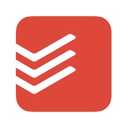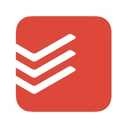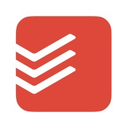Todoist vs GoodDay (2025 Comparison)

Todoist offers a simple and intuitive interface with a wide range of integrations, making it a versatile choice for managing tasks efficiently.
- Simple and intuitive interface
- Wide range of integrations
- Reliable mobile app
- Limited advanced features
- Basic reporting capabilities
Free plan?
YesStarting price
$4 per month
GoodDay provides comprehensive project management features and advanced reporting tools, ideal for teams managing complex projects.
- Comprehensive project management
- Advanced reporting tools
- Robust collaboration features
- Slight learning curve
- Higher price point
Free plan?
YesStarting price
$4 per month per userWhat is Todoist?
Todoist is a task management tool designed to help individuals and teams organize their tasks and projects efficiently. It offers a simple interface with powerful features like task prioritization, project templates, and collaboration tools. With Todoist, you can easily track your progress, set deadlines, and integrate with other productivity apps, making it a versatile choice for managing daily tasks and long-term projects.
What is GoodDay?
GoodDay is a comprehensive project management and productivity platform that helps teams streamline their workflows and enhance collaboration. It offers a range of features including task management, time tracking, and reporting tools, all within a user-friendly interface. GoodDay is designed to improve team efficiency and communication, making it an ideal choice for businesses looking to optimize their project management processes.
Pros and Cons of Todoist vs GoodDay

Pros & Cons of Todoist
- Todoist offers a clean and user-friendly interface that makes it easy for users to navigate and manage their tasks efficiently. This simplicity is particularly beneficial for new users who want to get started quickly without a steep learning curve.
- With Todoist, you can connect to a variety of other productivity tools, enhancing its functionality and allowing you to streamline your workflow. This flexibility makes it a versatile choice for users who rely on multiple apps.
- The Todoist mobile app is known for its reliability and ease of use, allowing users to manage their tasks on the go. This feature is particularly useful for those who need to stay organized while away from their desks.
- While Todoist offers essential task management features, it lacks some of the advanced capabilities found in other tools. This limitation may be a drawback for users who require more complex project management functionalities.
- Todoist's reporting features are relatively basic, which may not be sufficient for users who need detailed insights into their productivity and project progress. This limitation could be a concern for teams that rely heavily on data analysis.

Pros & Cons of GoodDay
- GoodDay offers a wide range of project management features, including task dependencies, time tracking, and custom workflows. These capabilities make it an ideal choice for teams managing complex projects with multiple stakeholders.
- With GoodDay, you can generate detailed reports and analytics that provide valuable insights into team performance and project progress. This feature is particularly beneficial for managers who need to make data-driven decisions.
- GoodDay's collaboration tools, such as real-time chat and document sharing, enhance team communication and streamline workflows. These features are especially useful for remote teams that rely on digital communication.
- Due to its extensive feature set, GoodDay may require a bit of time for new users to fully understand and utilize its capabilities. This learning curve could be a consideration for teams looking for a quick setup.
- GoodDay's comprehensive features come at a higher cost, which may not be feasible for smaller teams or individuals with limited budgets. This price point could be a barrier for those seeking a more affordable solution.
Todoist vs GoodDay: At A Glance
Value to Price
Value to Price is a critical dimension that evaluates how well the features and benefits of a tool justify its cost. For Todoist, the pricing is competitive, offering a range of features that cater to both individual and team needs. GoodDay, on the other hand, provides a more extensive feature set, which may justify its higher price point for larger teams. If you're looking for a tool that offers more features for the price, GoodDay might be the better choice.
Ease of Use
Ease of Use measures how intuitive and user-friendly a tool is. Todoist excels in this area with its clean and straightforward interface, making it easy for users to get started quickly. GoodDay also offers a user-friendly experience, but its extensive features may require a slight learning curve. If you prioritize simplicity and ease of use, Todoist is likely the better option.
Functionality
Functionality assesses the range and depth of features a tool offers. Todoist provides essential task management features that are sufficient for most users. GoodDay, however, offers a broader range of project management tools, including time tracking and reporting, making it more suitable for complex project management needs. If you need advanced functionality, GoodDay is the better choice.
Scalability
Scalability evaluates how well a tool can grow with your needs. Todoist is suitable for small to medium-sized teams, offering features that can scale as your team grows. GoodDay, with its robust project management capabilities, is better suited for larger teams and organizations. If scalability is a priority, GoodDay is the more appropriate choice.
Integrations
Integrations measure how well a tool can connect with other software. Todoist offers a wide range of integrations with popular productivity apps, making it easy to incorporate into existing workflows. GoodDay also provides numerous integrations, but its focus on project management tools may offer more specialized options. If you need extensive integration capabilities, GoodDay might be the better fit.
Customer Support
Customer Support evaluates the quality and availability of support services. Todoist offers reliable support through various channels, including email and help centers. GoodDay provides similar support options, with additional resources like webinars and tutorials. If comprehensive support is important to you, GoodDay may offer a slight edge.
Security
Security assesses how well a tool protects user data. Both Todoist and GoodDay prioritize security, offering features like data encryption and secure access controls. However, GoodDay's focus on enterprise-level security may provide additional peace of mind for larger organizations. If security is a top concern, GoodDay might be the better choice.
Overall Rating
Overall Rating is a summary of all dimensions, providing a holistic view of a tool's performance. Todoist scores well across all dimensions, making it a solid choice for task management. GoodDay, with its higher overall rating, offers more comprehensive project management capabilities, making it ideal for larger teams and complex projects.
Todoist vs GoodDay: A Detailed Breakdown of Key Features
Task Management
When it comes to task management, Todoist offers a straightforward and intuitive interface that makes it easy to create, organize, and prioritize tasks. I found it particularly useful for managing my daily to-do lists and keeping track of deadlines. GoodDay, however, takes task management to the next level with its advanced features like task dependencies and custom workflows. If you're managing complex projects with multiple team members, GoodDay's task management capabilities might be more suitable for your needs.
Collaboration Tools
Collaboration is key in any team environment, and both Todoist and GoodDay offer tools to facilitate this. Todoist provides basic collaboration features like task sharing and commenting, which are great for small teams. GoodDay, on the other hand, offers more robust collaboration tools, including real-time chat and document sharing. If your team relies heavily on collaboration, GoodDay's features might be more beneficial.
Time Tracking
Time tracking is an essential feature for many teams, and while Todoist offers basic time tracking capabilities, GoodDay provides a more comprehensive solution. With GoodDay, you can track time spent on tasks, generate reports, and even integrate with other time tracking tools. If accurate time tracking is crucial for your projects, GoodDay is the better choice.
Reporting
Reporting is another area where GoodDay shines. While Todoist offers basic reporting features, GoodDay provides detailed analytics and customizable reports that give you insights into team performance and project progress. If you need in-depth reporting capabilities, GoodDay is the tool to consider.
Mobile App
Both Todoist and GoodDay offer mobile apps that allow you to manage tasks on the go. Todoist's app is known for its simplicity and ease of use, making it a favorite among users who need to quickly access their tasks. GoodDay's app, while slightly more complex, offers more features and customization options. If you need a mobile app with advanced capabilities, GoodDay might be the better option.
Customization
Customization is important for tailoring a tool to your specific needs. Todoist offers basic customization options, such as custom labels and filters, which are sufficient for most users. GoodDay, however, provides more extensive customization features, allowing you to create custom workflows and dashboards. If you require a high level of customization, GoodDay is the tool to choose.
Pricing Comparison of Todoist and GoodDay
We’ve compiled the pricing tables and highlighted the key features of both Todoist and GoodDay to aid in your decision-making process. Let’s explore what each platform has to offer.

Todoist Pricing Plans
- Smart quick add for efficient task management.
- Flexible list and board layouts for organization.
- 3 filter views to customize your workflow.
- 1 week activity history to track progress.
- Calendar layout to visualize your schedule.
- Task reminders and duration for timely completion.
- 150 filter views for advanced customization.
- Unlimited activity history for comprehensive tracking.
- Up to 500 team projects for large-scale management.
- Granular team activity logs for detailed insights.
- Shared templates to streamline processes.
- Team roles and permissions for structured access.

GoodDay Pricing Plans
- Up to 15 members can collaborate seamlessly.
- Access to 100+ templates for quick setup.
- Basic analytics and custom workflows available.
- Mobile and desktop apps for on-the-go access.
- Advanced customization and time tracking features.
- Gantt views and unlimited automations.
- Advanced integrations and public sharing options.
- Priority support and GoodDay API access.
- Workload and resource management capabilities.
- Finance module and CRM integration.
- Advanced HR and custom task IDs.
- Expense tracking and two-factor authentication.
- SAML 2.0 Single Sign-On and enterprise access control.
- Private cloud option and custom reports.
- Risk matrix and goals & performance management.
- Invoices and finance reports with custom roles.
Our Rating Methodology
We thoroughly evaluate each project management tool, focusing on key aspects like functionality, ease of use, and scalability. By analyzing user feedback and conducting hands-on testing, we ensure our recommendations align with your needs. Each factor is weighted to provide a reliable final rating, helping you make informed decisions.
Todoist or GoodDay: Which One Matches Your Business Needs?
Choose Todoist If You Need ...
- Simple task management
If you are looking for a straightforward and intuitive task management tool, Todoist is an excellent choice. Its user-friendly interface and wide range of integrations make it ideal for individuals and small teams.
- Mobile task management
If you need a reliable mobile app for managing tasks on the go, Todoist's app is known for its simplicity and ease of use. It's perfect for users who need to stay organized while away from their desks.
Choose GoodDay If You Need ...
- Comprehensive project management
If you require a tool with advanced project management features, GoodDay is the better choice. Its comprehensive capabilities, including task dependencies and custom workflows, make it ideal for managing complex projects.
- Advanced reporting needs
If you need detailed reporting and analytics, GoodDay offers advanced tools that provide valuable insights into team performance and project progress. It's perfect for managers who rely on data-driven decision-making.
Frequently Asked Questions
 Which tool is better for small teams, Todoist or GoodDay?
Which tool is better for small teams, Todoist or GoodDay?
 Does GoodDay offer more advanced project management features than Todoist?
Does GoodDay offer more advanced project management features than Todoist?
 How do the mobile apps of Todoist and GoodDay compare?
How do the mobile apps of Todoist and GoodDay compare?
 Which tool offers better integration capabilities?
Which tool offers better integration capabilities?
 Is GoodDay more expensive than Todoist?
Is GoodDay more expensive than Todoist?
 Which tool provides better customer support?
Which tool provides better customer support?

Anastasia Belyh
Anastasia Belyh is a senior tech writer with over 15 years of experience in marketing, sales, and business software. Having worked in investment banking, management consulting, and founded multiple companies, her in-depth knowledge and hands-on expertise make her software reviews authoritative, trustworthy, and highly practical for business decision-makers.



